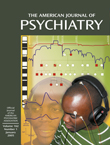Inflammatory Markers, Depression, and Cardiac Disease
To the Editor: We read with great interest the report by François Lespérance, M.D., and colleagues (1) about the relationship of inflammatory markers to major depression in patients with cardiac disease. They noted one previously published study that found an association between interleukin-1β and interleukin-6 levels and depression in patients about to undergo angioplasty (2). We wish to consider their results in the context of a previously published pilot study by our group (3), in which we found that serum interleukin-1β level was not associated with depressive symptoms or diagnosis in 37 patients age 50 years and older with coronary artery disease who were recruited from a cardiac rehabilitation program. Our negative results are consistent with those of Dr. Lespérance et al., who did not find an association between depression and interleukin-6 or C-reactive protein levels. They thoughtfully considered the possibility that statins might obscure any relationship between such inflammatory markers and depression. We add that a similar confound may be posed by the overall burden of medical illness, which was correlated with interleukin-1β level in our study group. The obscuration of any depression-inflammatory marker relationship may be particularly important in older patients, with their greater physical comorbidities. Also, times of acute cardiac exacerbation, with concomitant increases in levels of inflammatory markers, may make the association with depression most evident. This may help explain the positive findings of Appels et al. (2).
Given such complex potential confounds, the finding by Dr. Lespérance et al. of a cross-sectional association between soluble intercellular adhesion molecule 1 and depression are particularly noteworthy. We applaud their efforts and heartily second their call for careful longitudinal studies in light of the causal models they raised as well as other proposed models by which chronic age-associated inflammatory processes or immunodysregulation might contribute to the pathogeneses of depression (4, 5).
1. Lespérance F, Frasure-Smith N, Théroux P, Irwin M: The association between major depression and levels of soluble intercellular adhesion molecule 1, interleukin-6, and C-reactive protein in patients with recent acute coronary syndromes. Am J Psychiatry 2004; 161:271–277Link, Google Scholar
2. Appels A, Bär FW, Bär J, Bruggeman C, De Baets M: Inflammation, depressive symptomatology, and coronary artery disease. Psychosom Med 2000; 62:601–605Crossref, Medline, Google Scholar
3. Lyness JM, Moynihan JA, Williford DJ, Cox C, Caine ED: Depression, medical illness, and interleukin-1β in older cardiac patients. Int J Psychiatry Med 2001; 31:305–310Crossref, Medline, Google Scholar
4. Katz IR: Depression and frailty: the need for multidisciplinary research. Am J Geriatr Psychiatry 2004; 12:1–5Crossref, Medline, Google Scholar
5. Lyness JM, Caine ED: Vascular disease and depression: models of the interplay between psychopathology and medical comorbidity, in Physical Illness and Depression in Older Adults: A Handbook of Theory, Research, and Practice. Edited by Williamson GM, Shaffer DR, Parmelee PA. New York, Kluwer Academic/Plenum, 2000, pp 31–49Google Scholar



